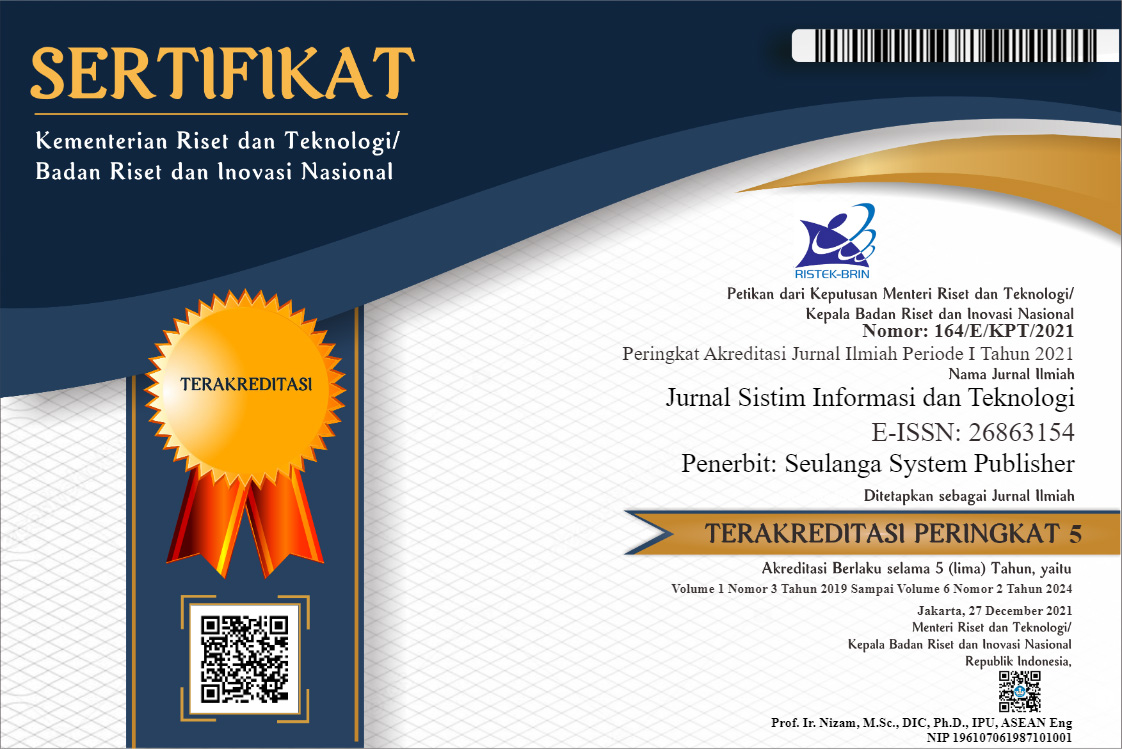Data Mining Menggunakan Rough Set dalam Menganalisa Modal Upah Produksi pada Industri Seragam Sekolah
DOI:
https://doi.org/10.37034/jsisfotek.v1i4.12Keywords:
Rough set, Capital, Wages, Production, IndustryAbstract
In a fund industry is a very important factor, mismanagement or unavailability of funds can have a negative impact on the industry, the successful shop still uses internal capital that is capital from the sale of the store itself, the sales results are not always sufficient to pay the production wage money cause late payments which adversely affect the performance of workers and the industry itself, production wage data on successful stores can be utilized by using the rough set method to find solutions to predict future production wages, The results found 57 rules of 8 reducts from 11 Equivalence Classes that provide new information that is the cause factor of not achieving capital production wages, the main factor is income followed by sewing wages, cut wages.
References
Abdullah, D., Erliana, C. I., & Juliana, J. (2015). Implementasi Metode Rough Set Untuk Menentukan Data Nasabah Potensial Mendapat Pinjaman. Prosiding SENATKOM 2015, 2015(January 2016), 1–8.
Gamarra, C., Guerrero, J. M., & Montero, E. (2016, July 1). A knowledge discovery in databases approach for industrial microgrid planning. Renewable and Sustainable Energy Reviews. Elsevier Ltd. https://doi.org/10.1016/j.rser.2016.01.091
Guntur, M., Santony, J., & Yuhandri, Y. (2018). Prediksi harga emas dengan menggunakan metode Naïve Bayes dalam investasi untuk meminimalisasi resiko. Jurnal RESTI (Rekayasa Sistem Dan Teknologi Informasi), 2(1), 354–360. https://doi.org/10.29207/resti.v2i1.276
Chen, F., Deng, P., Wan, J., Zhang, D., Vasilakos, A. V., & Rong, X. (2015). Data mining for the internet of things: Literature review and challenges. International Journal of Distributed Sensor Networks. Hindawi Publishing Corporation. https://doi.org/10.1155/2015/431047
Fatmawati, K., & Windarto, A. P. (2018). Data Mining: Penerapan rapidminer dengan K-means cluster pada daerah terjangkit demam berdarah dengue (DBD) berdasarkan provinsi. Computer Engineering, Science and System Journal, 3(2), 173. https://doi.org/10.24114/cess.v3i2.9661
Setiono, U., Siregar, H., & Anggraeni, L. (2017). Struktur modal dan modal kerja PT XYZ serta pengaruhnya terhadap kinerja perusahaan. Jurnal Aplikasi Bisnis Dan Manajemen, 3(1). https://doi.org/10.17358/jabm.3.1.131
Khare, S. D., & Whitehead, T. A. (2015, December 1). Introduction to the Rosetta Special Collection. PLoS ONE. Public Library of Science. https://doi.org/10.1371/journal.pone.0144326
A Putra, Z.A. Matondang, & N Sitompul. (2018). Implementasi Algoritma Rough Set Dalam Memprediksi Kecerdasan Anak. Pelita Informatika: Informasi dan Informatika 17 (4), 386-393
Patel, Hetal & Patel, Dharmendra. (2017). Crop Prediction Framework Using Rough Set Theory. International Journal of Engineering and Technology. 9. 2505-2513. https://doi.org/10.21817/ijet/2017/v9i3/1709030266
Jamaris, M. (2017). Implementasi Metode Rough Set Untuk Menentukan Kelayakan Bantuan Dana Hibah Fasilitas Rumah Ibadah. Jurnal Inovtek Polbeng, 2(2), 161–172. https://doi.org/10.35314/isi.v2i2.203
Haryati, S., SudarsonHaryati, S., Sudarsono, A., & Suryana, E. (2015). Implementasi Data Mining untuk Memprediksi Masa Studi Mahasiswa Menggunakan Algoritma C4.5. Jurnal Media Infotama,11(2),130–138. https://jurnal.unived.ac.id/index.php/jmi/article/view/260/239
Amalia, Hilda & Evicienna, Evicienna. (2017). KOMPARASI METODE DATA MINING UNTUK PENENTUAN PROSES PERSALINAN IBU MELAHIRKAN. Jurnal Sistem Informasi. https://doi.org/10.21609/jsi.v13i2.545
Melanda, E., Hunter, A., & Barry, M. (2016). Identification of locational influence on real property values using data mining methods. CyberGeo, 2016. https://doi.org/10.4000/cybergeo.27493
Mardani, A., Nilashi, M., Antucheviciene, J., Tavana, M., Bausys, R., & Ibrahim, O. (2017). Recent fuzzy generalisations of rough sets theory: A systematic review and methodological critique of the literature. Complexity. Hindawi Limited. https://doi.org/10.1155/2017/1608147









